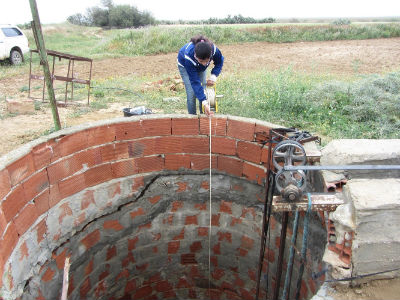 Photo: Measurement of the piezometric level of the deep aquifer in a well, Sebkha Kelbia, Central Tunisia, ©Damien Aube
Photo: Measurement of the piezometric level of the deep aquifer in a well, Sebkha Kelbia, Central Tunisia, ©Damien Aube
The sebkha Kelbia is a temporary natural lake that occupies a large topographic depression (130 km²) located in the north-east of Kairouan in central Tunisia. It is the main outlet of wadis Zeroud, Merguellil and Nebhana and the outflow of large plio-quaternary aquifer of the plain of Kairouan. Environmental and anthropogenic changes have influenced the hydrological regime of the sebkha Kelbia and consequently the activities of the local population. This study aims to study the evolution of sebkha Kelbia from multiple angles: characterization of past and present hydrological functions in connection with the human activities; analysis of the dynamics of the exchanges surface-groundwaters flux. The methodology of this thesis is based on the combination of multiple sources of information (biophysical and social) to produce a considerably good analysis of the resource evolution.
Keywords: groundwaters, geochemistry, remote sensing, investigations, modeling






